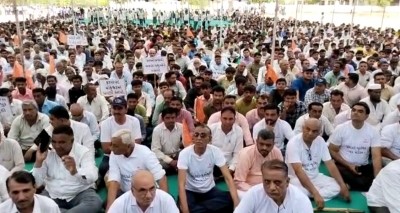
Palanpur (Gujarat), Thousands of farmers on Thursday gathered in Palanpur of the Banaskantha district in north Gujarat to demand the state explore the possibility of filling the water reservoirs -- Karmavat Lake and Mukteshwar Dam with Narmada water to resolve water shortage of the area.
More than 20,000 farmers of 125 villages of the Vadgam and neighbouring Taluka joined the protest rally. "People of the area are facing severe water shortage for more than two decades as annual rainfall is less and underground water is depleting. The only solution is -- these two reservoirs should be filled with Narmada water," said M.M. Gadhvi, member of the farmers protest organising committee.
Giving details about the water reservoirs, farmer leaders said that Karmavat lake is spread over 98 hectares, Mukteshwar dam water capacity is around 30 million cubic meter. If water is drawn from Narmada canal, from Didrol village of Sidhpur Taluka, the pipeline can be first laid up to Mukteshwar dam and from the dam to Karmavat lake. At present the underground water level is at 800 feet.
"Their demand is genuine, the region has been facing water crisis for a long time. There is no permanent solution, as it is rain fed. Annual rainfall is very less due to which the water shortage has become acute," said Shankar Chaudhary, BJP leader, chairman of the Banaskantha District Milk Producers Union (Banas dairy).
He added that in crisis, farmers have to purchase water tankers to feed domestic animals. If these water reservoirs are filled with Narmada water, it can recharge underground water, because of which groundwater level can increase.
He said Banas dairy too has launched a programme to dig lakes in the region with people's participation. This will reduce dependency on Narmada waters, if there is good rain.
"Technical possibilities will be explored, such as how to lift water from the Narmada canal and take it up to the said reservoirs," said Anand Patel, Banaskantha Collector.
A meeting was chaired by Chief Minister Bhupendra Patel on Wednesday, in which irrigation and water supplies engineers too were present. They were asked to work on technical possibilities. Soon the problem will be addressed, said Anand Patel.


.jpeg)

